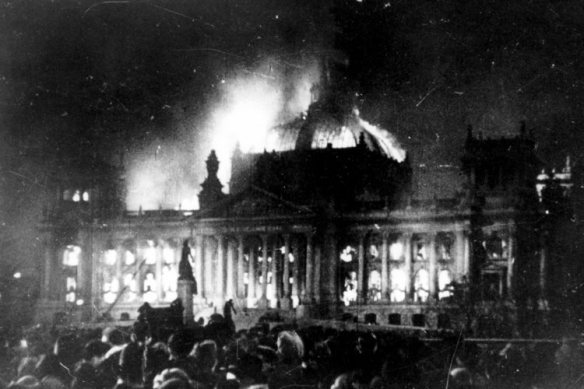February 27, 1933
Politics, Germany: Having only recently been appointed Chancellor of Germany on 30 January 1933, Adolf Hitler was anxious to consolidate his power. Within a month, that hope became a certainty with the Reichstag Fire of 27 February 1933.
Hitler's initial plan to achieve dominion was through the ballot box. Elections were planned for 5 March 1933. Despite the power of Hitler's NSDAP, it never had achieved a majority of the vote. A week before the vote, though, a fire broke out in the Reichstag during the evening. Hermann Goering was on the site of the fire quickly to coordinate firefighting efforts, but the building was gutted.
Suspicion focused immediately on communist insurgents. Marinus van der Lubbe, a young communist, was captured at the scene and took credit for the fire. He alone was convicted of it, and he was beheaded in January 1934. There is a reason to believe that van der Lubbe was insane, and in any event, his conviction was overturned decades after the war based on a 1998 German law providing that all convictions under Hitler's rule were null and void.
It is easy to assume that because Goering was on the scene that he had something to do with it and used the communist as a patsy. Given Adolf Hitler's free use of false-flag incidents throughout their reign, this is quite possible.
The fire had many consequences aside from the death of van der Lubbe. It led directly to the Reichstag Fire Bill which was passed the day after the fire, and the Enabling Act which was passed on 23 March 1933. Together, those bills created a dictatorship under Adolf Hitler. In addition, the decision of the court not to convict other alleged perpetrators of the fire led Hitler to create a new People's Court which became infamous for handing out death sentences.
 |
| The suspect van der Lubbe on trial. |
Pre-War
8-9 November 1923: Beer Hall PutschDecember 20, 1924: Hitler Leaves Prison
September 18, 1931: Geli Raubal Commits Suicide
November 8, 1932: Roosevelt is Elected
30 January 1933: Hitler Takes Office
February 27, 1933: Reichstag Fire
March 23, 1933: The Enabling Act
June 20, 1934: Hitler Plans the Night of the Long Knives
June 30, 1934: Night of the Long Knives
August 1, 1936: Opening of the Berlin Olympics
September 30, 1938: The Munich Agreement
November 9, 1938: Kristallnacht
August 1, 1939: Flight Tests of B-17 Flying Fortress
August 2, 1939: Einstein and the Atom Bomb
August 7, 1939: Goering Tries to Broker Peace
August 14, 1939: Hitler Decides To Attack Poland
August 15, 1939: U-Boats Put To Sea
August 16, 1939: Incident at Danzig
August 20, 1939: Battle of Khalkhin Gol
August 22, 1939: Hitler Tips His Hand
August 23, 1939: Ribbentrop-Molotov Pact
August 25, 1939: Hitler Postpones Invasion of Poland
August 27, 1939: First Jet Flight
August 31, 1939: The Gleiwitz Operation
2019

No comments:
Post a Comment